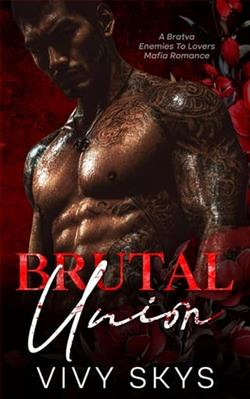Page 17 of Weave me a Rope
John should have waited until the marquess had left. He shouldn’t be climbing the tree at all—though it was a good choice. It was as tall as the tower, and on the far side of the towerfrom the main house, so someone in the tree was likely to go unobserved.
Spen studied the tree as the sun rose. The growth was at its lushest, with young green leaves and catkins covering and concealing the branches, but Spen knew how strong those branches were. They had grown particularly robust on this side, thanks to regular pruning. The gardeners kept them trimmed to prevent them from spanning the path, so no one could enter the tower from the tree—or, for that matter, escape by the tree from the tower
Not that the bars on the windows made either of these actions possible. The marquess was nothing if not thorough.
Spen could open the window, however, and he did. His spirits rose. If John was careful, he might be able to get within perhaps ten yards of the tower, and he’d be impossible to see from the ground, should anyone be out and about this early in the morning. It was an easy climb, too. John shouldn’t be attempting it with only one useable arm, but Spen didn’t doubt his agility and balance.
The wait was interminable. Spen crossed the room twice to another window from which he could see the stable, and each time the longer hand had crept only a few minutes. No more. John would come, or he wouldn’t. And if he didn’t, Spen would worry about him for the rest of the day.
Despite his watching, he didn’t see John arrive at the tree. The boy’s head suddenly popped into sight, surrounded by leaves.
He was at the same level as Spen, but a few yards away. His intense determined look softened into a grin. “Spen! You’re here! You’re able to move around. The housekeeper said you would be up and about by now, but I was worried.”
“I’m well,” Spen lied. “Nothing for you to worry about, John.”
“Good. What does he want you to do, Spen? The servants say he is keeping you locked up until you sign something, but they don’t know what.”
Spen never knew how much the servants told John, and how much John picked up from the conversations of others because he was good at moving around the huge old house as silently as a ghost. Certainly, though, John was usually way ahead of Spen at hearing any news. “What happened to Miss Milton, John? The housekeeper said she got away safely, but I was concerned the marquess might send someone after her.”
John shook his head. “He didn’t. Not that I have heard. I don’t think she went far, though. Just to the inn at Crossings. The stable boy saw her horses at the inn when he took two of ours to be shod.”
“She is off our land at least. But she must go back to London, John. To her uncle. He’ll be able to protect her.” Spen hoped. The marquess had a long reach though, as Spen and John both had cause to know. Their mother had died at the hands of highwaymen, or so the world believed. But the marquess had told her sons he had sent the villains after her and her lover when Lady Deerhaven had attempted to escape her miserable marriage.
“What does the marquess want you to sign?” John insisted.
“A marriage contract. Between me and Lady Daphne Ashburton, the daughter of the Earl of Yarverton. I’m not going to do it. I am marrying Cordelia Milton, even if I must wait until his lordship is dead. But the more I refuse, the more danger there is to her. Go and see if she is at the inn, John. If she is, tell her to go home to her uncle and stay safe. Tell her I love her, and I will come for her as soon as I can.” Even as he spoke, his stomach clenched, and his heart seemed to flip in his chest.Please, let her wait for me.
“He will make your life miserable,” John warned. He frowned. “We need a rope. If you had a rope, you could lower it and I could send up anything you need.”
Spen looked over his shoulder at the room. No ropes lying around, and if he started ripping up the sheets or the bedcovers, his keeper would notice. “Maybe I could take the fabric off the backs of the chairs,” he mused. “I don’t know if I could get enough pieces to reach the ground, though. It must be close to fifty feet.”
“How many chairs?” John wondered.
“Half a dozen, and three sofas.”
John had a furious frown, a sign he was thinking. “Horsehair,” he said.
Spen frowned. “Horsehair?” Then it dawned on him. A couple of years ago, a stable master at one of the estates had taught the pair of them to make ropes from horsehair from which they then formed halters, and even bridles and reins. “The chairs will be stuffed with horsehair,” he realized. He could possibly make a rope long enough to reach the ground. It could work. Not only that, but it would at least give him something to do.
“I have to go,” John said. “I need to be back in my room before the maid comes. I’ll try to get to Crossings today, Spen. See you here tomorrow?”
Spen shouldn’t let him do it. It was a dangerous climb. On the other hand, the marquess was leaving, and the house was always safer and more relaxed when he was gone. Besides, Spen needed to hear that Cordelia was safe.
“Tomorrow,” he agreed.
He stripped the horsehair out of one of the chairs and tossed his clothes over the depleted remains. No one noticed its miserable state. Not the housekeeper who came to check his wounds. Not the estate steward, who stood in the door as thesun approached its zenith and read a letter from the marquess that informed Spen he had five days to recover his senses and his obedience.
“You will have nothing to do but sit here and reflect on your duty to me and to the Deerhaven name,” his lordship had written. “One meal a day. Nothing to read. Nowhere to go. Sign the marriage contract, and you will be released to eat your normal meals, to follow your normal amusements, within reason. Within the confines of this house. Once you are married as I bid, I will allow you to resume your usual activities.”
Any comment was pointless. His father was not going to change his mind, and Spen was not going to change his own. The steward did not wait for him to comment, in any case. He turned away, and Fielder shut the door between them.
The cord was under the bed, where Spen had kicked it each time he heard the bolts being drawn back on his door. He retrieved it and got back to work.
By the time Fielder came back with his meal, Spen was hungry enough to eat anything. Soup and bread and not much of it. A jug of ale and another of water. He was glad of it.
“That’s it, my lord,” the man said, with an uncharacteristic note of apology.
By the time it was too dark to continue, the cord stretched the length of the room four times. He’d paced the room out and estimated he had about eighty feet of double-twisted horse hair cord. It wasn’t perfect. He’d hand-rolled the hairs together, using the double-twist method the stable master had taught them. The resulting cord was tighter in some places than others and thicker or thinner where he’d added hair as the strand grew longer.















